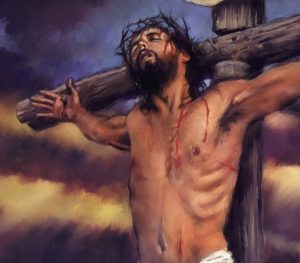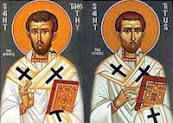The Reign of God, Radical Discipleship and Redemptive Suffering:
Memorial – Saints Timothy and Titus
(2 Tim 1:1-8; Ps 96; Lk 10:1-9)
*********************************************************
Two sentences connect the readings today on this memorial of Timothy and Titus. Paul, in the first reading to Timothy, invites him to join in suffering for the gospel. Luke, in today’s gospel, has Jesus sending his disciples out to heal and to proclaim the kingdom of God.
The connection is the message for us today: As disciples of Jesus, we are to proclaim the Kingdom through radical discipleship and redemptive suffering.
The Kingdom of God, according to Paul in Romans 14, is all about the peace, joy and justice of the Holy Spirit. Peace and joy are not just passing emotions but gifts of the Holy Spirit that we can claim as disciples of Jesus. Justice is a right relationship with God, others, ourselves and all of God’s creation.
There is, for St. Paul, a mysterious way to proclaim this kingdom of God, and that is suffering for the gospel, unlike the gospel of prosperity promoted by some televangelists. Recall the words of Jesus to Ananias about Saul in Damascus, “I myself will show him how he will have to suffer for the sake of my name.” That suffering will take the shape of radical discipleship and redemptive suffering.
Jesus himself gave us the pattern of radical discipleship through his passion and death on the cross. From the time he was arrested in the garden to the time he died on the cross, Jesus hardly did anything – everything was done to him. That was his passion, or passio – which means “being done unto.” Yet Jesus did more to save the world during those last 18 hours of his life on earth than through all his active ministry of teaching, healing and even raising the dead.

On the cross Jesus also showed us the nature of redemptive suffering. Throughout his passio, Jesus accepted that suffering without bitterness or resentment. There was only love and forgiveness – “Father, forgive them, they know not what they do.” That was the redemptive suffering which Paul invited Timothy to share.
Radical discipleship will come to us when for some reason, usually age or illness, we can no longer do things for ourselves – everything is done to us. The key to the kingdom is how we accept this suffering. Can we make it redemptive suffering? If we can accept some inconvenience or suffering like Jesus did, without bitterness or resentment, just love and forgiveness, then we are in the kingdom of God.
Our world today does not understand this mystery at all, which is why there is such a focus on avoiding suffering at all costs, leading to abortion at one extreme, and physician assisted death at the other. Our world is impoverished in this lack of appreciation for suffering. A psychologist in Ottawa wrote in Maclean’s Magazine, we used to think the enemy was death – now we know it is suffering.
So, we need to pray today not just for more vocations and labourers for the harvest, but also for a deeper understanding of the mystery of radical discipleship and redemptive suffering that helps bring about the kingdom of God here on earth.
The church provides us with two great models today – Saints Timothy and Titus. They were disciples of St Paul, and Paul’s letters to them are found in the New Testament. Timothy was a close friend of Paul, working with Paul in his ministry, including serving time in prison, his radical discipleship. Eventually, Timothy was consecrated the bishop of Ephesus. He was stoned to death in 67 A.D. for denouncing pagan worship, his redemptive suffering. Paul named Titus bishop of Crete. He is said to have delighted in the innate goodness of others, and drew people to him for his kindness. Titus is said to have died of old age – that would be his radical discipleship and redemptive suffering. Timothy is the patron saint of stomach and intestinal disorders, while Titus is the patron saint of Crete.

Saints Timothy and Titus
St. Paul invited Timothy to rely on the power of God in suffering for the gospel. The Eucharist is our source of strength to accept radical discipleship and redemptive suffering into our lives.
May our celebration today strengthen our faith and empower us to build up the kingdom of God here on earth by our own radical discipleship lived out through redemptive suffering.
This




I am glad I am done making those golden ribbons and golden nuggets and those rings. There is many work to be done since you have to make like 200 bags .
We always remember the redemptive suffering when come by the Passion of Christ and during passion week or Lenten season . When Jesus is crucified on the cross on Friday. The Eucharist is Jesus Christ, it is the Body and Blood of Christ. When we receive the Eucharist we experience his sorrows, anger, resentment , pain and sufferings . We have the feeling what Jesus felt when he died on the cross and how he was in society. Especially, adoration of sacred Heart of Jesus Christ every first Friday of each month . Adoring the blessed sacrament which is the Eucharist. You will be praying to Jesus and experiencing his pain and sufferings. Amen
Thanks for the homilies about the passion of Christ and redemptive sufferings .